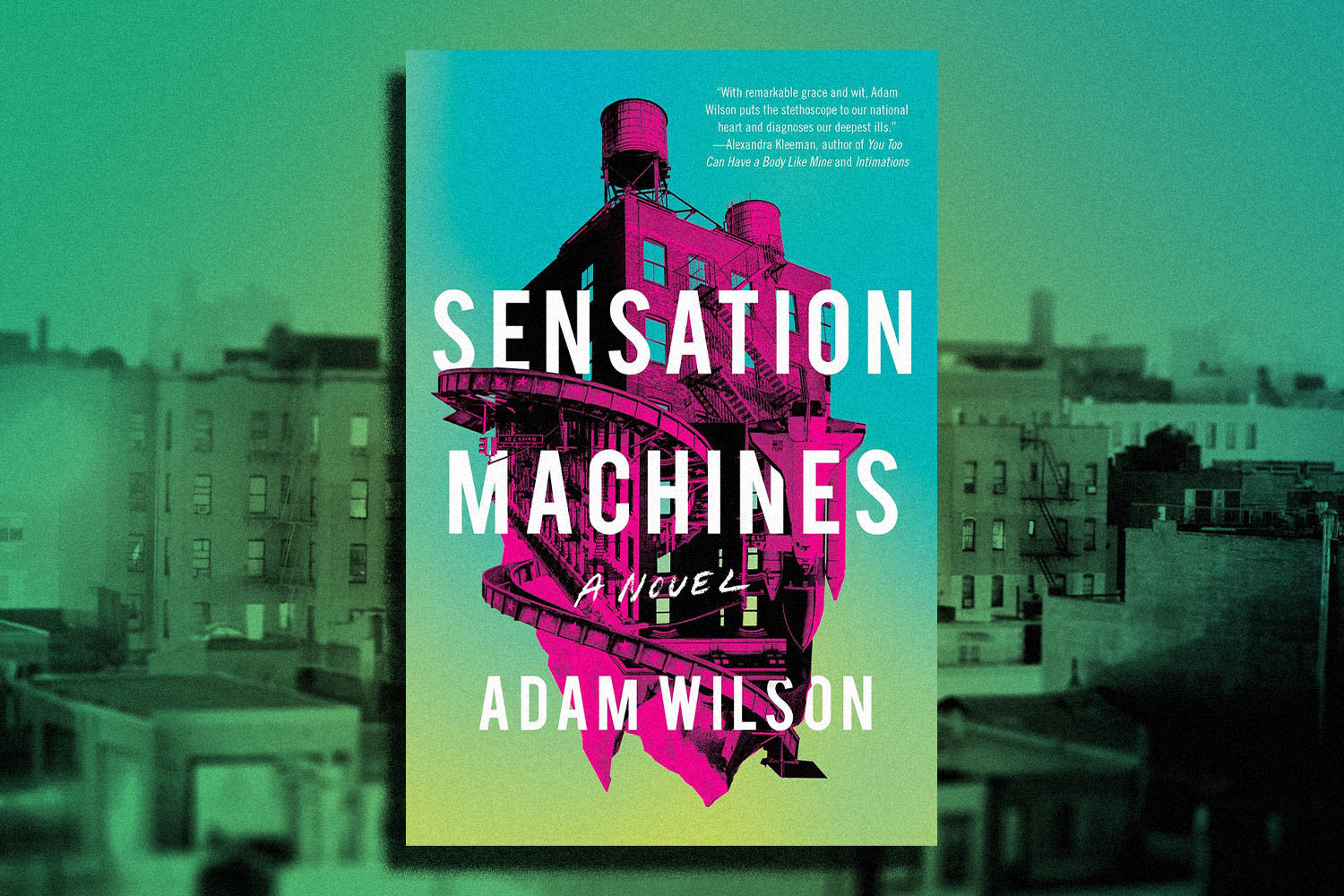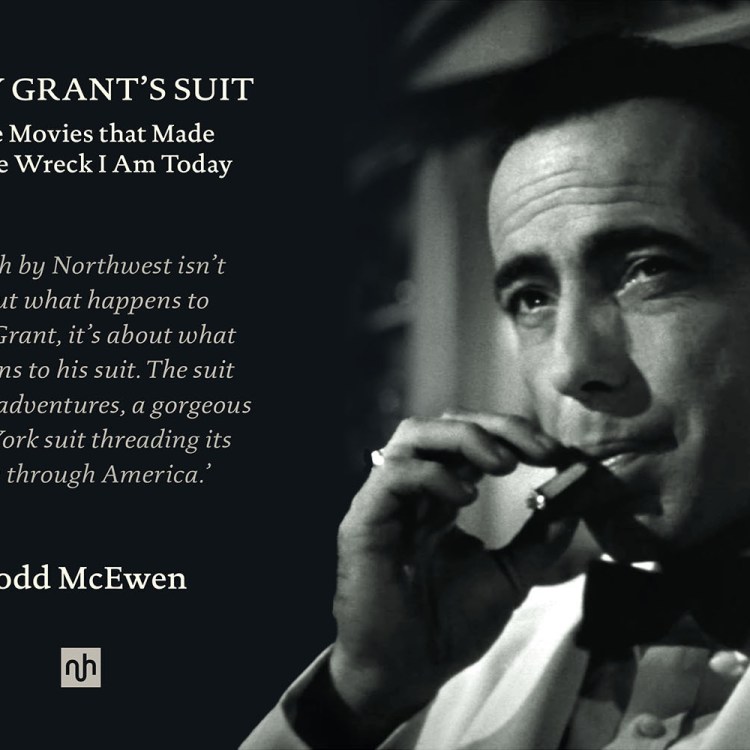Sensation Machines, the third book from Brooklyn-based author Adam Wilson, takes place during a fraught time in America, when an economic downturn has paralyzed the nation and groups of protesters take to the streets across the country demanding social justice.
Sound familiar? While there’s no viral pandemic in Wilson’s novel, the America that he’s envisioned looks a lot like the America we’re living in today. This was not, Wilson is quick to clarify, on purpose.
“I worked on this book for a very long time,” he tells InsideHook from Boston, where he’s temporarily quarantining with his son and parents. (Wilson’s wife is in Washington, D.C., helping her sister with her newborn child.) Specifically, he worked on it for nine years. The timing of its release turns out to be … maybe not a happy coincidence, but a coincidence nonetheless.
Wilson’s darkly funny novel follows Michael and Wendy, a married couple in trouble. Michael, a securities trader, has just lost all his family’s money in a stock market crash, and lost his longtime best friend to a murder. Meanwhile, Wendy, a marketing expert, has been doing work for a shadowy company that’s running a massive advertising campaign against a universal basic income bill. Michael’s attempts to bring his friend’s killer to justice and Wendy’s work collide in a shocking way as their marriage — not on steady ground in the first place — continues to crumble.
It’s a clever, sobering look at a dystopian near future, but when Wilson started writing it, it wasn’t set in the future at all.
“Originally the idea was that the book was going to be set around the 2008 financial crash,” he says. When Wilson began the book, he worked for Simon & Schuster, the publisher located in Rockefeller Plaza, not far from what was then the home of the now-defunct financial services firm Lehmann Brothers. He ran into a high school classmate one day who worked as a trader and was disheveled, upset and unsure what would happen to his job. “There was something sort of humanizing about seeing this guy, who I’d known as a child and was a really nice guy, and who maybe had been involved in some things that had really fucked up the country in some really deep and grievous ways,” Wilson says.
That was the origin of Michael, but the character would undergo some changes in the following years, becoming “more like an Adam Wilson character” and “less like a banker.”
“Michael’s not the most trustworthy in terms of what he’s saying,” Wilson explains. “He’s a lofty thinker and maybe a little bit of a bullshitter. So my hope is that the reader is being signaled, to some degree, to take everything he’s saying with somewhat of a grain of salt.”
And while Wilson kept the plot point about the stock-market crash, he changed the timing to the future, not wanting his novel to be “beholden to history.”
Then more history happened. Wilson was close to finished with a draft of a book when Donald Trump was elected president in 2016.
“I kind of had to scrap a lot and rethink a lot of things,” Wilson says. “My editor, Mark Doten, gave me what felt like such a damning critique. He said that at times it felt like the novel was a critique of Obama-era neoliberalism. That doesn’t work in the Trump era.”
Cryptocurrency plays a big role in the novel, and Wilson says Sensation Machines required a lot of research into the fields of finance and technology. He turned to his wife, who works in technology, for help in understanding the world of cryptocurrency.
“I didn’t want it to be too bogged down in the [technoIogy],” Wilson says. “I wanted it to feel believable and true, but also I wanted it all to be a metaphor. It has to be believable, but also symbolic.”
As he did in his first novel, Flatscreen, Wilson mixes reality with something like science fiction in parts of the book, imagining a world that looks a lot like ours, but with some changes. The social networks that Wendy leverages for her job, for example, include “Facebook, Twitter, Tumblr, Ru.ffy, Pim-Pam, Twitch and Instagram.”
“I liked the idea of it being slightly off center,” Wilson says. “In my first novel, I had a similar thing, where I had a character that’s constantly referencing all of these movie titles and titles of TV shows. I did, like, three-quarters real movies and shows, and then about a quarter of them made up. Then when I was doing press interviews, people kept saying, ‘Oh, I couldn’t track down this movie, it’s not on IMDB.’ And I was like, ‘It’s made up.’”
Sensation Machines, though bleak in outlook, is still quite funny; humor is a trademark of Wilson’s previous fiction.
“Humor is kind of my natural mode, I think,” Wilson says. “The hard thing was to figure out when to hold back and allow a scene or a moment not to have any jokes in it. For me, the bigger challenge was to trust that if I don’t include a bunch of jokes, it’s OK, and that there are other things in there that are going to engage or interest the reader.”
Wilson’s book is a near-future dystopia, and he’s publishing it in the middle of a current dystopia, meaning any plans for bookstore appearances had to go out the window. The irony, of course, isn’t lost on him.
“It feels very surreal,” he says. “The struggle from conception to publication has been a long and tiring road. I feel like doing in-person events takes this very abstract thing, writing a book, and makes it feel kind of concrete, in a way. And so without that, it just feels very abstract.”
He’s hoping he’ll find some sense of satisfaction when his book finally hits (virtual) shelves.
“I tend to be a person who has a hard time allowing myself to take pleasure in anything I’ve done,” he says. “I’m always moving on to the next thing or trying to. So, I’m trying to step back a little bit and just feel good about it. But that’s hard.”
This article was featured in the InsideHook newsletter. Sign up now.



















